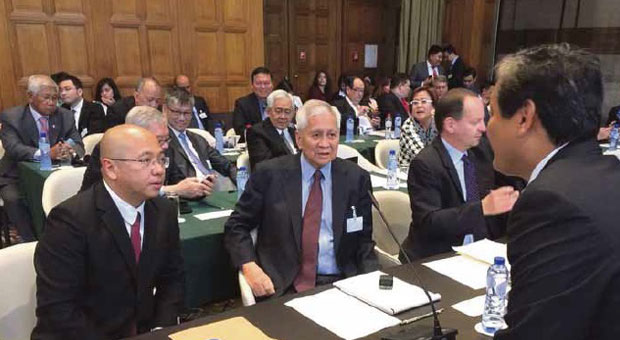
ARBITRATION AGAINST CHINA Solicitor General Florin Hilbay, Foreign Secretary Albert del Rosario and Philippine Ambassador to the Netherlands Jaime Victor Ledda chat before the start of the oral arguments on the case the Philippines filed against China’s claims over the West Philippine Sea in the Permanent Court of Arbitration in The Hague. PHOTO FROM ABIGAIL VALTE’S TWITTER ACCOUNT
On the second day of oral arguments before a United Nations arbitral tribunal in The Hague, lawyers for the Philippines insisted the court had jurisdiction over the case the country had brought to nullify China’s claim over almost the entire South China Sea.
Deputy presidential spokesperson Abigail Valte said one of the Philippines’ foreign lawyers, Alan Boyle, argued on Wednesday for “the strength of the Philippines’ environmental and fishing claims against China.”
In a statement from The Hague, Valte said the Philippines’ lawyers told the tribunal the case did not include the specific exemptions under the United Nations Convention on the Law of the Sea (Unclos) that would prevent the court from “exercising jurisdiction over the case.”
The government has acknowledged that jurisdiction is the foremost issue that the Philippines has to hurdle at the court before its complaint against China can move forward.
Government officials and maritime law experts have said that should the tribunal decide that it does not have jurisdiction over the complaint, the Philippines would have to rethink its strategy against China’s expansionism in the South China Sea.
According to Valte, Philippe Sands, another foreign lawyer for the Philippines, answered questions about jurisdiction from a member of the tribunal.
“Advocates Lawrence H. Martin, professor Bernard H. Oxman and Paul S. Reichler took turns presenting arguments involving various points on why the Philippines’ claims fall squarely within the jurisdiction of the tribunal,” Valte said.
It was Sands who closed the first round of arguments “by summarizing the submissions of the Philippines presented in the course of the hearings,” Valte said.
Friday wrap-up
The arbitral court will issue a ruling, called an “award,” after the hearing wraps up on Friday, but it was not known on Wednesday how long it would take and whether it would be released in public.
The panel’s ruling is binding on both parties, according to the court’s arbitration rules published on its website.
Reichler on Tuesday said he expected a decision on jurisdiction within 90 days.
A ruling on the merits of the case could take years.
China has refused to participate in the arbitration, insisting it has “undisputed sovereignty” over the South China Sea.
“China opposes any form of arbitration process proposed and promoted by the Philippines,” Chinese foreign ministry spokesperson Hua Chunying told reporters in Beijing on Tuesday.
Matter of sovereignty
In a position paper in December last year, China argued that the dispute with the Philippines was not covered by Unclos because it was ultimately a matter of sovereignty, not exploitation rights.
China claims 90 percent of the South China Sea. The Philippines, Vietnam, Malaysia, Brunei and Taiwan claim overlapping parts of the strategic waterway.
Maritime law expert Jay Batongbacal of the University of the Philippines told the Inquirer on Wednesday that all the claimants in the South China Sea dispute should exercise “restraint and patience,” as the resolution of the overlapping claims would take time.
Batongbacal said it could take the tribunal some three months before it could issue a decision on case jurisdiction alone. A hearing on the merits of the case could take longer.
In the meantime, Batongbacal said, “everybody should keep calm.”
PH interests
He said it would be helpful for the Philippines to first identify its interests in the South China Sea.
“We haven’t really articulated and identified our interests. It’s very general. Everybody wants to protect his territory. Everybody has that interest. We have to settle among ourselves what really are our interests in the South China Sea,” said Batongbacal, director of the UP Institute for Maritime Affairs and Law of the Sea.
He said the Philippines should also identify its common interests with the other claimants, including China.
It is, for all intents and purposes, to maintain peace in the region. “I don’t think anybody wants war,” he said.
“We have to determine if the common interests outweigh the competing ones and try to cooperate based on our common interests. We have to develop trust and build confidence with each other so that we would be comfortable when we have to deal with our competing interests,” Batongbacal said.–With wire reports
RELATED STORIES
PH argues environmental, fishing claims vs China
PH in The Hague: China violated int’l law